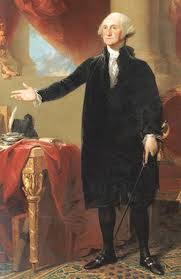Chapter 6. The Constitution and Early Republic, 1789–1801 
The American character starts to be defined and expanded as we figure out how to govern this new country and its diverse peoples.
The specific focus of this unit will be on:
A. Washington, Hamilton, and shaping of the national government
B. Emergence of political parties: Federalists and Republicans
C. Republican Motherhood and education for women
Reading Assignments:
Textbook Chapters:
Ch. 6 Brinkley 14.pdf
Federalist Debate
John Adams Episode 6 "Unnecessary War"
You can stream for free on Amazon Prime: https://www.amazon.com/dp/B00687Q0VC
OR you can check out the DVD from Ms. McDonald
Class Notes:
Homework Assignments:
Printable copy of homework: C6 Homework.pdf
Part 1 - Ideas/themes to know and include in your notes:
Slavery in the Constitution
Virginia Plan vs. NJ Plan
Checks and balances
Bill of Rights
Hamilton’s Financial Plan
Assumption of State Debts
Whiskey Rebellion
Washington’s Farewell Address
Jay’s Treaty(1794)
Pinckney's Treaty (1795)
XYZ Affair
Alien and Sedition Acts (1798)
Virginia and Kentucky Resolutions
Part 2 - Short Answer Question: COMPLETE SENTENCES ONLY - Answer all parts of the question in full. 3/4ths page minimum response.
How did the colonial, and later, state governments influence the United States Constitution? What elements were incorporated into the federal Constitution? Be specific with your evidence/examples.
Part 3 - Vocabulary: These words are from the chapter and will be used in context or need to be defined on the weekly chapter quiz. They should be defined on the bottom of the textbook notes.
agrarian
federal
quasi
republic
sovereignty
inauspicious
malleable
despotism
lampoon
faction
correlation
insurgency
conciliate
inauguration
enumerate
Context Exercise: Determine whether the boldface word from the list makes sense in the context of the sentence. Circle the bolded words that are INCORRECT and write the correct vocabulary word from the list instead.
- Eventually, however, William Paterson of New Jersey submitted a substantive alternative to the Virginia Plan, a proposal for a “republic” as opposed to a “national” government.
- The XYZ Affair precipitated a state of faction war with France.
- A large nation would breed corruption and insurgencies because the rulers would be so distant from most of the people that there would be no way to control them.
- The cartoon correlates a celebrated fight on the floor of the House of Representatives in 1798 between Matthew Lyon, a Republican from Vermont, and Roger Griswold, a Federalist from Connecticut.
- John Adams was austere, rigid, and aloof; he had little talent at conciliating differences, soliciting support, or inspiring enthusiasm.
- Their demand for a bill of rights was a product of this belief: no government could be trusted to protect the liberties of its citizens; only by enumerating the natural rights of the people could there be any assurance that those rights would be preserved.
- Although Thomas Jefferson and other Republicans claimed to welcome occasional popular uprisings, the Federalists were horrified by such despotism as Shays’s Rebellion in Massachusetts and, later, the Whiskey Rebellion in Pennsylvania.
- Robert E. Brown, for example, argued in 1956 that “absolutely no inauguration” could be shown between the wealth of the delegates to the Constitutional Convention and their position on the Constitution.
- Most of the framers believed that organized parties were dangerous quasi formed groups to be avoided.
- Madison argued that a large republic would be less likely to produce tyranny because no single group would ever be able to dominate it.
- The founders raised the question, how could a national government exercise sovereignty concurrently with state governments?
- Adams win in the election of 1800 under inauspicious circumstances led to questions of the validity of his presidency.
- The representatives of the southern states feared that the power to regulate trade might interfere with their agrarian economy, which relied heavily on tobacco sales abroad, and with slavery.
- The introduction of the “necessary and proper”, or elastic, clause does not necessarily make the Constitution infinitely malleable.
- The use of checks and balances in the U.S. Constitutions lampoons the clear structure of executive, legislative, and judicial branches written into state constitutions in the 1770s.
Synonyms: From the word bank at the top, choose the word that has the same or nearly the same meaning as the boldface word in each sentence and write it on the line. You will not use all of the words.
- This was just the commencement of the pseudo war over trade and merchants, full warfare was not started until 1812. __________________________________
- Texas, with the territorial dimensions of an empire, expanded the botanical system for cotton cultivation in the Southeast. __________________________________
- Despite competing claims made by the British government and nearby Antigua, the small deserted island maintained its own political jurisdiction. __________________________________
- As time went on King George and Parliament’s autocracy grew more and more oppressive. __________________________________
- The Convention in 1787 and it debated the merits of state sovereignty vs. the benefits of an extended commonwealth with representation the state and federal levels. __________________________________
- This cabal of the opposition is itself fractured into dozens of splinter groups. __________________________________
- The defection of Benedict Arnold was considered an dire omen for the patriot cause, they lost someone who was considered a great military leader. __________________________________
- To appease these seemingly incompatible schemes, Madison and the founders constructed a Great Compromise to answer the demands for both state and proportional representation. __________________________________
Resources:
Comments (0)
You don't have permission to comment on this page.